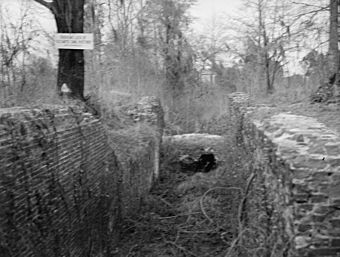Santee Canal facts for kids
Quick facts for kids |
|
|
Santee Canal
|
|

Frierson's Lock on the Old Santee Canal
|
|
| Location | Berkeley County, South Carolina, USA |
|---|---|
| Nearest city | Moncks Corner, South Carolina |
| Area | 50 acres (20 ha) |
| Built | 1793-1800 |
| Architect | Col. John Christian Senf |
| NRHP reference No. | 82003833 |
| Added to NRHP | August 11, 1982 |
The Santee Canal was one of the very first canals built in the United States. It was created to make a direct water path between Charleston and Columbia. Columbia was the new capital city of South Carolina. This important canal was added to the National Register of Historic Places in 1982. This list recognizes places that are important to history.
Contents
Building the Santee Canal
Why Was the Canal Built?
In 1786, the government of South Carolina, called the South Carolina General Assembly, allowed a company to build this canal. The main goal was to connect the Cooper River near Charleston with the Santee River. The Santee River then connected to the Congaree River and the city of Columbia. This made it easier to move goods and people between these important cities.
When Was the Canal Built?
Construction of the Santee Canal started in 1793. An engineer named Colonel John Christian Senf led the project. The canal officially opened for use in 1800. It took seven years to build this amazing waterway.
How Big Was the Canal?
The Santee Canal was about 22 miles (35 km) (35 kilometers) long. It had special water elevators called locks. Locks help boats move up or down between different water levels. The canal had two double locks and eight single locks. At the top, the canal was about 35 feet (11 m) (10.7 meters) wide. At the bottom, it was 20 feet (6.1 m) (6.1 meters) wide. The water in the canal was about 4 feet (1.2 m) (1.2 meters) deep.
The Canal's Later Years
Why the Canal Didn't Last
Even though it was a big project, the Santee Canal was not very successful. Not many boats used it, and there were problems with how it was built. Also, sometimes there were droughts, which meant not enough water in the canal.
The invention of railroads also made the canal less useful. Trains could move goods much faster and more easily. Because of these reasons, the canal company lost its special permission from the state in 1853. The canal was no longer used after 1865.
What Happened to the Canal Today?
Much of the old Santee Canal is now underwater. This happened when Lake Moultrie was built. You can still learn about the canal at the Old Santee Canal Park. This park is located in Moncks Corner, South Carolina. It is built on a spot called Stony Landing, which was once the very end of the canal.
Images for kids
 | Delilah Pierce |
 | Gordon Parks |
 | Augusta Savage |
 | Charles Ethan Porter |




